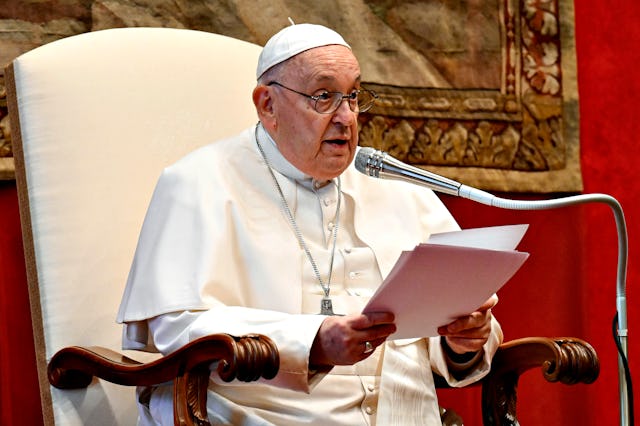The Pope Has Called For A Universal Ban On Surrogacy
Usually they are all for more babies.

Pope Francis has established himself as a pretty cool and liberal Catholic leader since his papacy began in 2013, but on Monday, during his “State of the World” address to church leaders, he came down hard on the practice of surrogacy around the world — and called for a universal ban on the practice.
“I deem deplorable the practice of so-called surrogate motherhood, which represents a grave violation of the dignity of the woman and the child, based on the exploitation of situations of the mother’s material needs,” the Pope said in his speech. “A child is always a gift and never the basis of a commercial contract.”
“At every moment of its existence, human life must be preserved and defended,” he said — and that countries should “prohibit this practice universally” and that unborn babies "cannot be turned into an object of trafficking."
Gestational surrogacy is simply when a woman or a person with a uterus carries a baby to term for someone else. It might take place with the woman’s eggs or another person’s eggs, and it usually involves an exchange of money or a business agreement (though not always). Surrogates have been used in the past by queer couples, couples who are having difficulty conceiving, or, more rarely, by women who choose not to carry their baby.
Recently, surrogacy has been in the news because of celebrities like Chrissy Teigan, Paris Hilton, Rebel Wilson, Kim Kardashian, Anderson Cooper, Andy Cohen, Gabrielle Union, Elton John, and Nick Jonas using the practice to have their children either alone or with their partners — all for various reasons.
While this is the first time the Pope has called for a universal ban on surrogacy, it’s not the first time he’s taken a hard stance against the practice. In 2022, he said surrogacy was an “inhuman and increasingly widespread practice of the ‘rented uterus’, in which women, almost always poor women, are exploited and children treated as commodities.”
At the same time, this is a conservative turn for a pope that has softened the church’s stance against the unfair treatment of LGBTQ communities and divorced people.
Currently, gestational surrogacy laws in the United States vary by state, and there are no federal laws or restrictions. Some states outlaw all forms of surrogacy, while others outlaw some types of surrogacy, such as commercial surrogacy. In some cases, surrogacy laws are not enforced, in others, a judge is a large factor in deciding cases. While surrogacy has become increasingly popular since its inception in 1985, there are still relatively few surrogate births in the United States — only a few thousand annually.
Surrogacy is illegal in a number of countries around the world, while others only allow altruistic surrogacy, where the carriers of the fetus are not compensated. Italy has outlawed it altogether.
The Pope and the Catholic Church have also come out against abortion and IVF — in other words, not letting women and families make their own decisions about their reproductive organs.